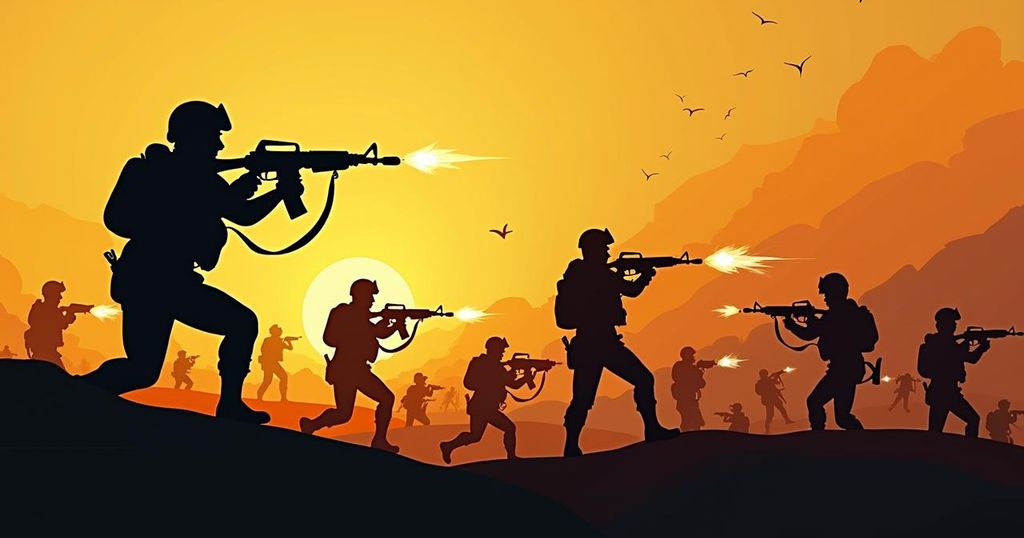Escalating Hostilities: Hezbollah, Israel, and the Broader Region
Hezbollah is actively engaging Israeli troops in southern Lebanon as Israel intensifies its attacks on Gaza. Experts emphasize ineffective military responses against Iran’s fortified nuclear facilities, whereas international leaders express concern and urge diplomatic dialogue. Jordan emphasizes its need to maintain peace, while Iranian actions escalate tensions. Hezbollah claims it is prepared for ongoing conflict, reaffirming its commitment to resist Israeli military operations.
The ongoing conflict in the Middle East has escalated as Hezbollah engages with Israeli forces in southern Lebanon, coinciding with intensified military actions by Israel against Gaza. Reports indicate that Israeli helicopters are evacuating injured soldiers from the border area following a Hezbollah offensive. According to Andreas Krieg, a senior lecturer at King’s College London, any military retaliation by Israel against Iranian assets is expected to be ineffective due to Iran’s nuclear facilities being secure in fortified locations. Krieg stated, “The attack by Iran yesterday was far more severe than in April… the response sent by Israel will have to be harsher than last time with aircraft perhaps entering Iranian airspace and targeting military sites.” He also expressed skepticism regarding Israel’s ability to achieve significant military objectives, pointing out potential overconfidence on Israel’s part. In response to the escalating tension, Italian Prime Minister Giorgia Meloni has announced a Group of Seven leaders’ call to address the crisis, noting a “deep concern” over Iran’s missile strikes against Israel and increasing instability in Lebanon. Jordan has declared its intention to avoid becoming embroiled in the conflict, with spokesperson Mohammad Momani emphasizing the government’s priority to protect Jordan and its citizens. Following the missile strikes from Iran—executed in retaliation for actions in Gaza and Lebanon—the Jordanian government has temporarily closed its airspace and reported missile debris landing in its territory, resulting in minor injuries to three individuals. Furthermore, the Lebanese army stated that Israeli troops momentarily crossed into Lebanese territory before their withdrawal. Indian officials have also expressed concern over the situation, urging restraint and emphasizing the necessity for diplomatic dialogue to prevent the conflict from spiraling further. Israeli officials have vowed to respond to Iranian missile strikes that targeted critical military sites within Israel. The Israeli Foreign Minister has notably restricted United Nations Secretary-General Antonio Guterres from entering the country due to perceived bias in his statements regarding Iran’s aggression. Hezbollah’s Mohammad Afif proclaimed that the organization possesses adequate resources to confront Israeli offensives, asserting that the recent clashes are merely the beginning of a more significant resistance effort. He declared, “this is only the first round” and reinforced Hezbollah’s commitment to defending their homeland. Videos circulating online captured scenes of missiles striking Israeli territory during the recent Iranian attacks, illustrating the escalating hostilities.
The current situation reflects a volatile state of affairs in the Middle East, particularly exacerbated by ongoing tensions between Hezbollah, Israel, and Iran. Hostile actions, including missile strikes, ground combat, and air attacks, have contributed to a significantly deteriorating security environment. The dynamics of regional powers’ military strategies and diplomatic efforts are critical in evaluating the potential for escalation or resolution of the conflict. The responses from various countries, including Jordan and Italy, highlight the global concern regarding a potential wider regional conflict stemming from these hostilities.
In summary, the conflict in the Middle East remains deeply concerning, marked by active military engagements between Hezbollah and Israeli forces and retaliatory actions from Iran. Major world leaders are convening to discuss the crisis, while governments in the region, such as Jordan, are taking measures to protect their sovereignty. The statements from military leaders and expert analysts indicate a belief that this situation may further escalate, and maintaining diplomatic channels remains crucial to preventing broader conflict.
Original Source: www.aljazeera.com




Post Comment